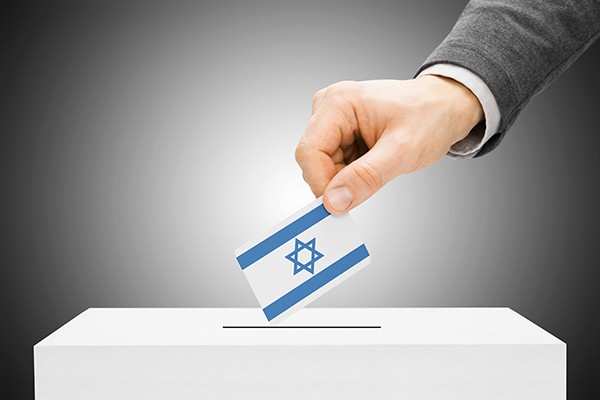
It is now “the morning after” the Israeli general election. The results are in. Experts and commentators keep calculating, and yet no one knows who our next prime minister will be and which government will lead us from here. How can this be? Welcome to the Israeli political scene where everything is possible, and nothing is easy.
I will walk you through this drama by relating alphabetically to some of the terms that have accompanied our lives here recently, and most likely will not go away anytime soon.
A - Arab Israelis: The voices of delegitimization helped them unite, get a good turnout, and see results. They’re now the third largest party in the Knesset and their leader, Odeh, will become much more influential, either as part of the next government or as the head of the opposition.
B - Binyamin (or Benjamin): Most likely, the first name of the next prime minister of the state of Israel. The surname, though, might be Netanyahu, Gantz, or both. (see also R)
C - Cameras: There was a last-minute attempt by Likud, in the name of transparency, to put cameras at the voting booths in the Arab sector. According to Mickey Zohar, a leading Likud MK, “This attempt turned over at us,” meaning that it backfired. (see also A)
D - Democracy: At times it’s impossible to cope with, at times it’s frustrating to deal with. It’s always slow, heavy, and confusing. “Indeed, democ¬ra¬cy is the worst form of Gov¬ern¬ment, except for all those oth¬er forms that have been tried from time to time.” (perhaps Churchill). We are so lucky to have it.
E - Election reforms: Unlike in the U.S., Israel doesn’t have a constitution, doesn’t vote based on geographical constituency, and doesn’t have direct personal elections. We’ve tried over the years to change some of it, but unsuccessfully. Please don’t hold it against us. (see also D)
F - Facebook: This and other upcoming election campaigns will determine whether Facebook is a tool or an obstacle for democracy.
G - Gevalt (or oy Gevalt): This old Yiddish “help call,” usually used in times of pogroms, became the “in” political phrase by the big parties to encourage Israelis to vote for them and not for their satellite parties.
H - Haredim: The two ultra-Orthodox parties that together represent 17 seats in the Knesset are the formal reason for calling this fast election and the main factor in identifying the next government.
I - Immunity: Netanyahu’s immunity against his criminal charges shaped the campaign and is now, based on last night’s results, no longer relevant.
J - Jewish/Democratic: This almost consensual character of the state of Israel could become the basis for shaping the unity government.
K - Kfar Achim: This small Moshav established by Holocaust survivors became the symbol of this election as both leading candidates to replace Netanyahu – Gantz and Katz – grew up there, as next-door neighbors.
L - Lieberman: Avigdor Lieberman reinvented himself to become the “kingmaker” and perhaps the only winner of this election. (see also W)
M - Mo’ed Bet: This term, meaning make-up exam, is what Israelis called this round of elections. Everyone is praying that we won’t find ourselves in a Mo’ed Gimel campaign.
N - Natural partners: This was the generic name for all of Netanyahu’s allies, which, this time around, don’t all live up to this identification anymore.
O - Otzma Yehudit: This extreme right-wing Kahanist party insisted on running separately, didn’t pass the threshold, and badly hurt their own right-wing block. (see also T)
P - President Rivlin: Perhaps the most influential person in this deadlock situation, he could use his presidential power to force a unity government. (see also U)
Q - Quote of the day: “This campaign was about the question of: To BB or not to BB.” – Sivan Meir
R - Rotation: We came up with this Israeli unique invention, a rotating Prime Minister, in the 80s and now it’s a viable option again.
S - Shared Society: This term, reflecting the tribal nature of Israeli society and the need for more cohesiveness, was adopted by our Federation’s Global Connections department a few years ago and has now become common in Israeli discourse.
T - Threshold: In order to be represented in the Knesset, a party must meet the threshold, or minimum number of votes. Since this number increased a few years ago, we have less parties and more unification, but votes for parties that don’t meet the threshold are lost.
U - Unity Government: While this is the most viable option as it looks right now, almost all the major players made campaign pledges not to sit together with their rivals – reflecting the recent atmosphere of hatred and incitement here.
V&W - Victory speeches and Winners: Last night there were no real winners, and everyone was very careful not to make any premature declarations.
X - X Factor: Israel is looking today, and probably for the next couple of weeks, for the X factor that will move us out of this stalemate situation and bring us to the next chapter in our political history.
Y - Yair: The son of Netanyahu is a loud, aggressive, sometimes dirty voice, by his own account, especially on social media. Many believe that he has a huge influence on his father and that he is planning his own political career.
Z – Zehut: This party that, among other things, lobbied for an open cannabis market eventually joined Likud and disappeared. But Zehut is also the Hebrew word for identity. This recent election was about the identity of our country and our society.
Drishat Shalom
